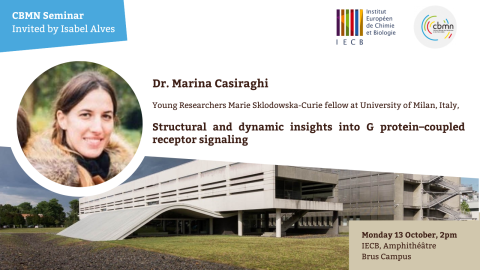Le 13 octobre prochain, Marina Casiraghi, jeune chercheuse Marie Sklodowska-Curie à l'université de Milan, Italie, donnera une conférence intitulée :
Structural and dynamic insights into G protein–coupled receptor signaling
Abstract
G protein coupled receptors (GPCRs) form the largest family of membrane proteins. They mediate most responses to hormones and neurotransmitters and underlie the senses of sight, smell and taste. Nearly half of all approved drugs act on GPCRs, which are also implicated in conditions such as drug addiction, including opioid dependence. Despite their structural diversity (~800 members) GPCRs couple to only four G protein subfamilies. The molecular determinants underlying GPCR selectivity remain poorly understood, yet such knowledge is essential for developing drugs that preferentially activate selected signaling pathway, a paradigm known as biased agonism. The β₂ adrenergic receptor (β₂AR), a prototypical class A GPCR, has been used to characterize GPCR selectivity and biased agonism through a combination of complementary structural (cryo-EM), biochemical and biophysical methods (EPR, fluorescence spectroscopy, single-molecule FRET). Our data provide mechanistic insights into G-protein subtype selectivity at the β₂AR and the molecular basis of GPCR activation and signaling in response to biased ligands.
Biographie
Marina Casiraghi a effectué son doctorat à l'Institut de biologie physico-chimique (IBPC) à Paris sous la direction du Dr Laurent Catoire. Elle s'est concentrée sur l'étude du paysage conformationnel des récepteurs couplés aux protéines G (RCPG) par RMN à l'état de solution. Pour son travail postdoctoral, elle a rejoint le laboratoire du professeur Brian K. Kobilka à l'université de Stanford, aux États-Unis. À Stanford, elle a fait le lien entre la détermination structurelle par cryo-EM et la biophysique pour étudier les déterminants moléculaires de l'activation et de la signalisation des RCPG. Pendant son séjour à Stanford, le Dr Casiraghi a bénéficié de la bourse postdoctorale Marie Sklodowska-Curie et de la bourse postdoctorale de l'American Heart Association (AHA). Actuellement, elle est titulaire d'une bourse Marie Sklodowska-Curie jeunes chercheurs à l'université de Milan, en Italie, où ses recherches portent sur de nouvelles stratégies thérapeutiques visant à cibler les RCPG impliqués dans la toxicomanie.
Contact
- Dr. Isabel D. Alves, Laboratoire de Chimie et Biologie des Membranes (CBMN), i.alves@cbmn.u-bordeaux.fr
Flyer Seminaire Dr. Marina Casiraghi
Dernière mise à jour :


